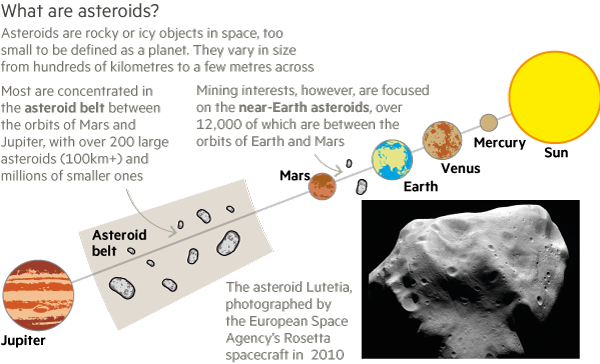Luxembourg launches plan to mine asteroids for minerals

Simply sign up to the US & Canadian companies myFT Digest -- delivered directly to your inbox.
Mining in space will take a leap from the realms of science fiction towards commercial reality on Wednesday when Luxembourg launches an official initiative to promote the mining of asteroids for minerals.
Luxembourg has a long-standing space industry and played a significant role in the development of satellite communications a generation ago, including setting up SES, one of the world’s largest satellite operators. In collaboration with US and European commercial partners it now aims to help create a space industry to exploit asteroids for metals and other materials that are scarce on Earth but plentiful in “near-Earth objects” (NEOs).
NEOs typically orbit the sun in trajectories tens of millions of miles away — much further than the moon but closer than Mars and within easy reach of unmanned spacecraft.
Jean-Jacques Dordain, director-general of the European Space Agency until last June and an adviser on the Space Resources initiative, told the FT: “I am convinced there is great scientific and economic potential in Luxembourg’s vision.”
Although space mining sounds futuristic, the basic technology already exists, said Mr Dordain: “We know how to get to asteroids, how to drill into them and how to get samples back to Earth.”
The Grand Duchy’s announcement, to be made by Etienne Schneider, deputy prime minister, will be attended by Deep Space Industries and Planetary Resources of the US, two of Luxembourg’s potential commercial partners which were set up with the long-term aim of mining asteroids.
Mr Schneider is expected to say that Luxembourg plans to collaborate with and invest in one or more space resources companies. However, he is unlikely to announce specific sums because parliament has not yet appropriated funds for the initiative.

The ultimate cost of setting up a mining industry in outer space is likely to run to tens of billions of dollars but, says Mr Dordain, “at the end there could be a market worth trillions”.
Asteroids are made from material left over from the formation of the solar system. They are richer in valuable metals than the Earth’s crust, where heavier elements sank into the planet’s core as it cooled.
Asteroid mining has two potential categories. The most valuable materials, such as heavy metals in the platinum group, would be brought back to Earth after preliminary processing in space. But other materials, including metals such as iron, nickel and tungsten, would be manufactured in space into spacecraft and tools for further exploration of the solar system, while water from the process would be split into its constituent elements of hydrogen and oxygen and used in rocket propellant.

The first stage of the nascent industry — prospecting for materials — is already in development, with Deep Space Industries and Planetary Resources working on spacecraft to find the most promising asteroids for mining. Commercial miners are also accessing the expertise of public space agencies that have sent scientific probes to asteroids and comets.
As well as technology and funding issues, asteroid miners face legal uncertainties. The outer space treaty of 1967, signed by the leading industrial countries, designated natural resources beyond Earth as the common heritage of mankind, although it did not address asteroid mining.
Last year the US passed the commercial space launch competitiveness act which, among many other things, gave US companies property rights over resources they obtained from asteroids. Some legal experts have suggested this violates the 1967 treaty.
Mr Dordain agrees that international legal issues need to be addressed but does not expect them to be a fundamental obstacle to asteroid mining. “I’m sure we can find a way forward,” he says, “just as we did with the extraction of deep sea resources”.
Comments